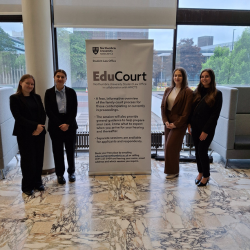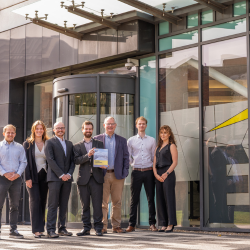-
Study
-
Quick Links
- Open Days & Events
- Unlock Your Potential
- Tuition Fees, Funding & Scholarships
- January Study
- Open Day 22 Nov
-
Undergraduate
- Application Guides
- UCAS Exhibitions
- Extended Degrees
- School & College Outreach
- Information for Parents
-
Postgraduate
- Application Guide
- Postgraduate Research Degrees
- Flexible Learning
- Change Direction
- Register your Interest
-
Student Life
- Students' Union
- The Hub - Student Blog
- Accommodation
- Northumbria Sport
- Support for Students
-
Learning Experience
- Real-World Learning
- Research-enriched learning
- Graduate Futures
- The Business Clinic
- Study Abroad
-
-
International
International
Northumbria’s global footprint touches every continent across the world, through our global partnerships across 17 institutions in 10 countries, to our 277,000 strong alumni community and 150 recruitment partners – we prepare our students for the challenges of tomorrow. Discover more about how to join Northumbria’s global family or our partnerships.
View our Global Footprint-
Quick Links
- Course Search
- Undergraduate Study
- Postgraduate Study
- Information for Parents
- London Campus
- Northumbria Pathway
- Cost of Living
- Sign up for Information
-
International Students
- Information for International Students
- International Events
- Application Guide
- Entry Requirements and Education Country Agents
- Global Offices
- English Requirements
- English Language Centre
- International student support
- Cost of Living
-
International Fees and Funding
- International Undergraduate Fees
- International Undergraduate Funding
- International Masters Fees
- International Masters Funding
- International Postgraduate Research Fees
- International Postgraduate Research Funding
-
International Partners
- Agent and Representatives Network
- Global Partnerships
- Global Community
-
International Mobility
- Study Abroad
- Information for Incoming Exchange Students
-
-
Business
Business
The world is changing faster than ever before. The future is there to be won by organisations who find ways to turn today's possibilities into tomorrows competitive edge. In a connected world, collaboration can be the key to success.
More on our Business Services-
Business Quick Links
- Contact Us
- Business Events
- Research and Consultancy
- Education and Training
- Workforce Development Courses
- Join our mailing list
-
Education and Training
- Higher and Degree Apprenticeships
- Continuing Professional Development
- Apprenticeship Fees & Funding
- Apprenticeship FAQs
- How to Develop an Apprentice
- Apprenticeship Vacancies
- Enquire Now
-
Research and Consultancy
- Space
- Energy
- AI and Tech
- CHASE: Centre for Health and Social Equity
- NESST
-
-
Research
Research
Northumbria is a research-rich, business-focused, professional university with a global reputation for academic quality. We conduct ground-breaking research that is responsive to the science & technology, health & well being, economic and social and arts & cultural needs for the communities
Discover more about our Research-
Quick Links
- Research Peaks of Excellence
- Academic Departments
- Research Staff
- Postgraduate Research Studentships
- Research Events
-
Research at Northumbria
- Interdisciplinary Research Themes
- Research Impact
- REF
- Partners and Collaborators
-
Support for Researchers
- Research and Innovation Services Staff
- Researcher Development and Training
- Ethics, Integrity, and Trusted Research
- University Library
- Vice Chancellors Fellows
-
Research Degrees
- Postgraduate Research Overview
- Doctoral Training Partnerships and Centres
- Academic Departments
-
Research Culture
- Research Culture
- Research Culture Action Plan
- Concordats and Commitments
-
-
About Us
-
About Northumbria
- Our Strategy
- Our Staff
- Our Schools
- Place and Partnerships
- Leadership & Governance
- University Services
- Northumbria History
- Contact us
- Online Shop
-
-
Alumni
Alumni
Northumbria University is renowned for the calibre of its business-ready graduates. Our alumni network has over 250,000 graduates based in 178 countries worldwide in a range of sectors, our alumni are making a real impact on the world.
Our Alumni - Work For Us
What will I learn on this module?
The American Studies dissertation is the most substantial piece of work you will produce during your undergraduate career. It will enable you to apply the skills you acquired at earlier levels to a discrete body of primary sources related to an identifiable area of scholarly enquiry. Dissertation topics will normally be chosen from an area you have studied before or are studying at Level 6 and be supervised by an appropriate tutor. Whereas the American Studies Extended Essay at Level 5 is explicitly interdisciplinary, Dissertations may utilise a single-disciplinary approach to the chosen subject, in line with each student’s developing interests and disciplinary inclinations.
How will I learn on this module?
This is an individual project which is negotiated between the student and their supervisor. There is therefore no set teaching syllabus, but there will be some introductory lectures at the beginning of the semester. The lectures are accompanied by fortnightly workshops, which will provide students with a background on sources, information retrieval, research skills and practice, and managing the dissertation. In semester two, you will meet with your supervisor for tutoring sessions on a one-to-one basis. These offer the opportunity for formative feedback and for discussing plans for future work.
How will I be supported academically on this module?
Your academic development will be supported through engagement with your peers, academic tutors, and programme leaders. Academic support is provided through workshops and through individual tutorials which allow specific issues to be addressed and to promote progress in academic development. The module tutor will be accessible within publicised office hours and via email. Your peers will provide you will a collaborative learning environment, and your programme leader will guide you through the requirements and expectations of your course. You will also be supported through individual engagement with the academic literature and resources available on the eLearning Portal. Formative feedback will be on-going throughout seminar activities and essay tutorials.
What will I be expected to read on this module?
All modules at Northumbria include a range of reading materials that students are expected to engage with. Online reading lists (provided after enrolment) give you access to your reading material for your modules. The Library works in partnership with your module tutors to ensure you have access to the material that you need.
What will I be expected to achieve?
Knowledge & Understanding:
1. An extensive knowledge of a particular topic related to the concerns of the discipline of American Studies or its component disciplines (including but not limited to History, Politics, Literature, Film Studies).
2. An awareness and understanding of the range of literature and information concerning a particular topic.
Intellectual / Professional skills & abilities:
3. An ability to develop a grounded and focused research question concerning a particular topic, and a structured, analytical and reflective argument in a written form.
4. An ability to critically reflect on the location of their dissertation within an evolving body of scholarship on their chosen topic, including the use of theory and methodology as appropriate to researching a particular topic.
Personal Values Attributes (Global / Cultural awareness, Ethics, Curiosity) (PVA):
5. An ability to understand and apply the ethical considerations required of the researcher undertaking research into a particular topic.
How will I be assessed?
The assessment strategy for the module corresponds with the module’s learning outcomes and learning and teaching strategy. Assessment is by a dissertation proposal of 500 words (formative) due mid-way through Semester 1 and a 10,000-word dissertation (summative) submitted in semester two. Students will receive formative assessment through two draft chapters submitted in Semesters 1 and 2, as well as workshop discussions and tutorials throughout the year. The summative assessment will assess MLOs 1-5.
Pre-requisite(s)
None
Co-requisite(s)
None
Module abstract
Please find details of this module in the other sections provided.
Course info
UCAS Code T700
Credits 40
Level of Study Undergraduate
Mode of Study 3 years Full Time or 4 years with a placement (sandwich)/study abroad
School Humanities and Social Sciences
Location City Campus, Northumbria University
City Newcastle
All information is accurate at the time of sharing.
Full time Courses are primarily delivered via on-campus face to face learning but could include elements of online learning. Most courses run as planned and as promoted on our website and via our marketing materials, but if there are any substantial changes (as determined by the Competition and Markets Authority) to a course or there is the potential that course may be withdrawn, we will notify all affected applicants as soon as possible with advice and guidance regarding their options. It is also important to be aware that optional modules listed on course pages may be subject to change depending on uptake numbers each year.
Contact time is subject to increase or decrease in line with possible restrictions imposed by the government or the University in the interest of maintaining the health and safety and wellbeing of students, staff, and visitors if this is deemed necessary in future.
Useful Links
Find out about our distinctive approach at
www.northumbria.ac.uk/exp
Admissions Terms and Conditions
northumbria.ac.uk/terms
Fees and Funding
northumbria.ac.uk/fees
Admissions Policy
northumbria.ac.uk/adpolicy
Admissions Complaints Policy
northumbria.ac.uk/complaints












